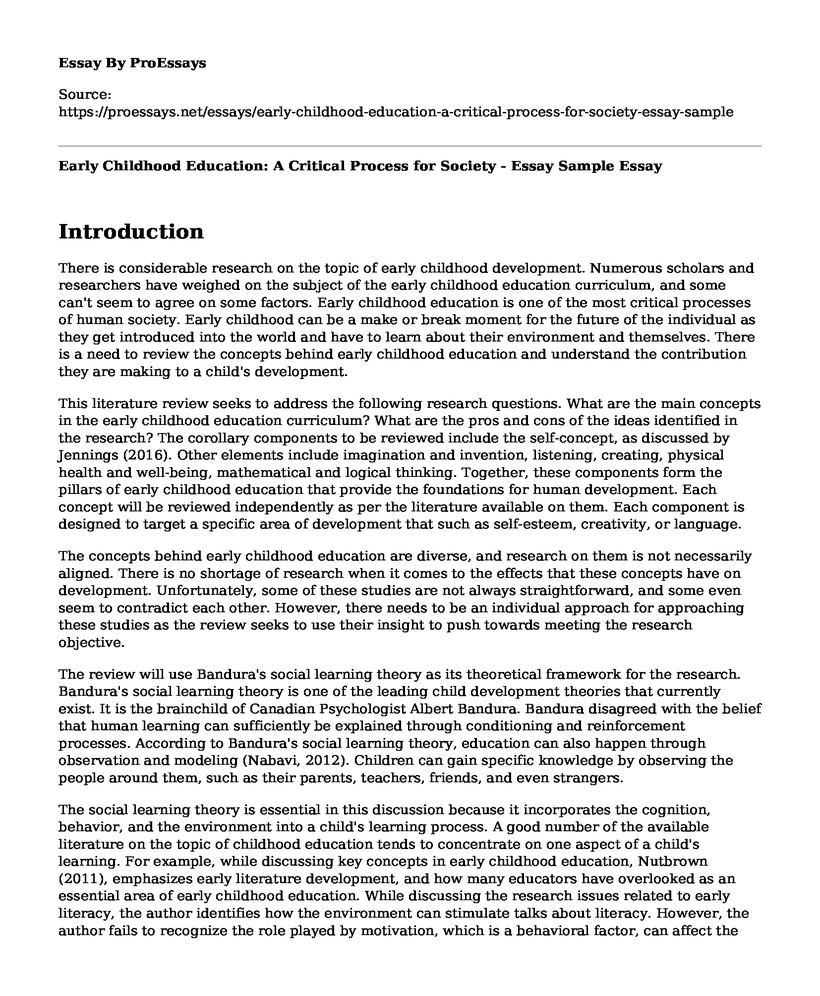Introduction
There is considerable research on the topic of early childhood development. Numerous scholars and researchers have weighed on the subject of the early childhood education curriculum, and some can't seem to agree on some factors. Early childhood education is one of the most critical processes of human society. Early childhood can be a make or break moment for the future of the individual as they get introduced into the world and have to learn about their environment and themselves. There is a need to review the concepts behind early childhood education and understand the contribution they are making to a child's development.
This literature review seeks to address the following research questions. What are the main concepts in the early childhood education curriculum? What are the pros and cons of the ideas identified in the research? The corollary components to be reviewed include the self-concept, as discussed by Jennings (2016). Other elements include imagination and invention, listening, creating, physical health and well-being, mathematical and logical thinking. Together, these components form the pillars of early childhood education that provide the foundations for human development. Each concept will be reviewed independently as per the literature available on them. Each component is designed to target a specific area of development that such as self-esteem, creativity, or language.
The concepts behind early childhood education are diverse, and research on them is not necessarily aligned. There is no shortage of research when it comes to the effects that these concepts have on development. Unfortunately, some of these studies are not always straightforward, and some even seem to contradict each other. However, there needs to be an individual approach for approaching these studies as the review seeks to use their insight to push towards meeting the research objective.
The review will use Bandura's social learning theory as its theoretical framework for the research. Bandura's social learning theory is one of the leading child development theories that currently exist. It is the brainchild of Canadian Psychologist Albert Bandura. Bandura disagreed with the belief that human learning can sufficiently be explained through conditioning and reinforcement processes. According to Bandura's social learning theory, education can also happen through observation and modeling (Nabavi, 2012). Children can gain specific knowledge by observing the people around them, such as their parents, teachers, friends, and even strangers.
The social learning theory is essential in this discussion because it incorporates the cognition, behavior, and the environment into a child's learning process. A good number of the available literature on the topic of childhood education tends to concentrate on one aspect of a child's learning. For example, while discussing key concepts in early childhood education, Nutbrown (2011), emphasizes early literature development, and how many educators have overlooked as an essential area of early childhood education. While discussing the research issues related to early literacy, the author identifies how the environment can stimulate talks about literacy. However, the author fails to recognize the role played by motivation, which is a behavioral factor, can affect the learning process.
The book by Nutbrown (2011) is an example of the unidimensional view that is present within various literary works related to early childhood development. This research seeks to fill that gap using Bandura's social learning theory that will unify studies conducted by multiple scholars. It will show how social learning theory can be applied to the education sector to create an inclusive learning environment that accounts for cognitive, behavioral, and environmental factors in early childhood education.
References
Jennings, K. D. (2016). Mastery motivation and the formation of self-concept from infancy through early childhood. In Mastery, motivation in early childhood (pp. 36-54). Routledge.
Nabavi, R. T. (2012). Bandura's social learning theory & social cognitive learning theory. Available online in https://www. researchgate. net/publication/267750204.
Nutbrown, C. (2011). Key concepts in early childhood education and care. Sage.
Cite this page
Early Childhood Education: A Critical Process for Society - Essay Sample. (2023, Apr 21). Retrieved from https://proessays.net/essays/early-childhood-education-a-critical-process-for-society-essay-sample
If you are the original author of this essay and no longer wish to have it published on the ProEssays website, please click below to request its removal:
- Alternate Observation in Authentic Learning
- My Volunteer Experience Essay
- Family Encouragements and Academic Achievements Personal Essay
- Factors That Contribute to Success in Life and Education Essay
- Paper Example on College Education: Is It Worth It?
- Paper Example on Nostalgic Fishing Vacation on a Sunny Day
- Essay Example on Four Parenting Styles: Benefits and Outcomes







